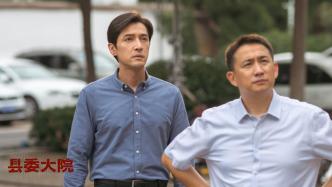
"County Party Committee Compound" directed by Kong Sheng and starring Hu Ge is one of the most watched dramas this year. The story takes place in the fictional Guangming County. Mei Xiaoge (played by Hu Ge), the former secretary of the mayor, parachuted to Guangming County to serve as the deputy secretary of the county party committee, member of the standing committee of the county party committee, and acting county magistrate. The former county magistrate left Guangming County in a mess because of fraud. How should Mei Xiaoge work with other leaders of the county party committee, including county party secretary Lu Qingshan (played by Huang Lei), deputy secretary Ai Xianzhi (played by Wu Yue), etc., to lead Guangming County to the real light?
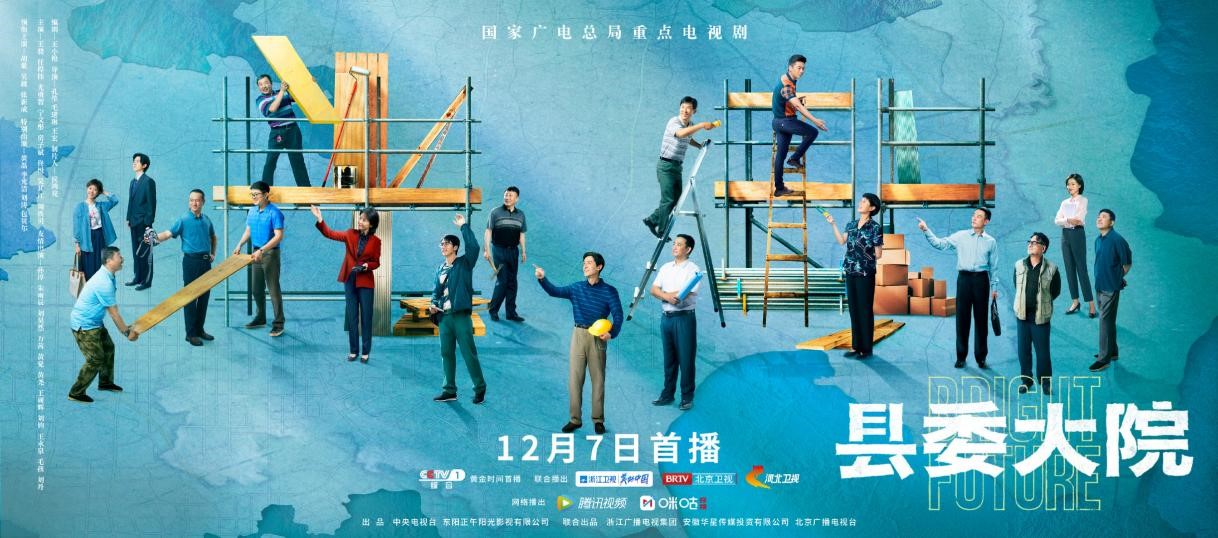
"County Party Committee Compound" poster
The creative intention of the series is quite clear: through the gorgeous transformation of Guangming County, it presents the common development trajectory of thousands of counties in China, and praises the thousands of grassroots cadres who take root in the front line and serve the people.
With Kong Sheng in charge, "County Party Committee Compound" has some obvious advantages. For example, the art is so realistic that the office of the county party committee compound makes people doubt whether it is a real scene shooting; for example, the portrayal of group portraits, no matter how many characters and branches, can be complicated but not chaotic, clear and orderly; another example It doesn't seem to have any strong drama, and the portrayal of the characters seems to lack that kind of highlight moment, but as long as the audience enters the field created by the drama, they can gradually understand the temperament and pursuit of the grassroots cadres in the drama. It naturally emerges in the hearts of the audience, thus realizing the artistic effect of "seeing the extraordinary in the ordinary, and seeing the broad in the simplicity".
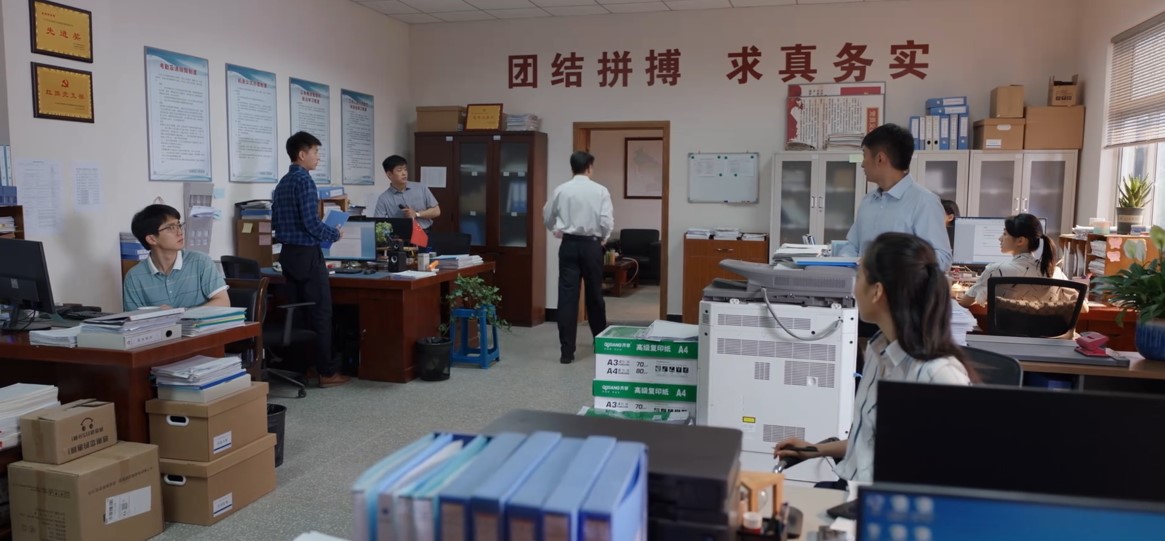
There is nothing to say about the drama art at noon
However, what tests the director the most, and is also the most capable, is its presentation of the political ecology at the grassroots level and the revelation of the living conditions of grassroots cadres.
As the saying goes, "Government of prefectures and counties leads to peace in the world." County governance has always been the foundation of peace and stability. Although the administrative level of the county seat is not high (generally at the departmental level), it is the most stable grassroots unit, the nerve ending of the party and government departments, and a key link in the national governance system: one end faces the management and management of the higher-level government. Control, on the one hand, faces the people in towns, especially in the vast rural areas, and connects hundreds of millions of people. All major policies of the country need to be implemented at the grassroots level through the hub of the county.
The complexity of grassroots political ecology and the difficulties of grassroots cadres are also here: on the one hand, they have to do their best to do the things assigned by their superiors, and on the other hand, they have to do their best to win the support of the people.
"County Party Committee Compound" is relatively accurate and wonderful in its presentation of the "difficulty at both ends" of grassroots politics.
Let's say "right" first. The author has heard the most "complaints" from the grassroots cadres and friends around me, which can be described in a few common sayings, namely, "a thousand threads on the top, a needle on the bottom", "a thousand hammers on the top, a nail on the bottom", "a thousand mouths on the top". , one leg below"... These words actually mean the same thing: almost all the tasks assigned by the above are "tight time, heavy tasks, high requirements, and heavy responsibilities". Many; the above is often "necessary and necessary", so they have to go through various inspections, appraisals and assessments to ensure the implementation of government orders. Therefore, many grassroots cadres usually work in a busy, very busy, very busy state. Add 2" "white plus black", exhausted.
In order to create the play, screenwriter Wang Xiaoqiang deliberately went to a county town to work for nearly 5 months. Judging from some details and handling of lines, the screenwriter did not come to the lower level this time. At the beginning of the series, Mei Xiaoge and Lu Qingshan had a small chat while eating in a small restaurant. Lu Qingshan described it like this, "It's like stepping on a unicycle, and there are six or seven small balls in your hand." This sentence sets the tone, and it can be regarded as the epitome of the working status of grassroots cadres.
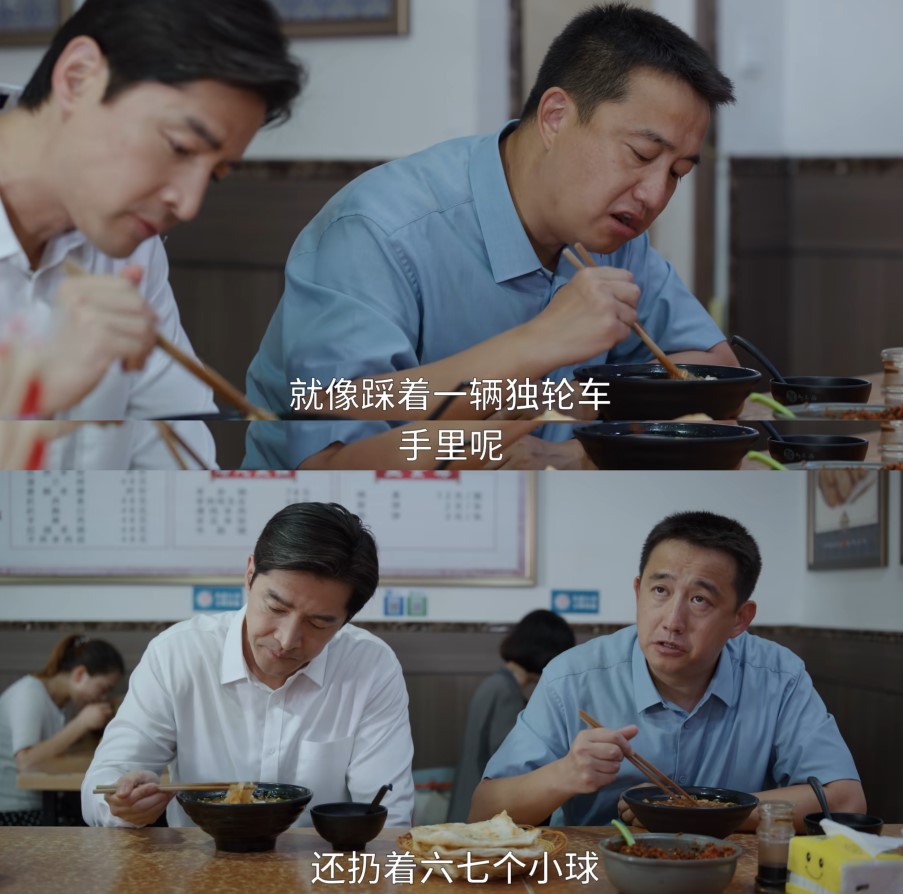
Grassroots work is really hard to do
Various assessments and evaluations by higher-level departments can certainly help grassroots cadres turn pressure into motivation and implement government orders in place, but they must also admit that some assessments and evaluations are not so reasonable and do not take into account the constraints of various objective factors. As a result, some grassroots cadres may have worked extremely hard, and they were still at the end of the assessment during the assessment, and they were even held accountable.
For example, Qiao Shengli (played by Wang Xiao), secretary of the Party Committee of Chengguan Town, is so busy all day long that he doesn't even have time to go home. As a result, Chengguan Town's assessment results are not satisfactory. He complained directly to his superiors on the phone, "You have time to look through the various reports in the town, and you need one every day on average. The annual fire prevention work report has been revised more than a dozen times before and after. In the end, because of A what, because what is called a format standard is wrong, this will be held accountable..."
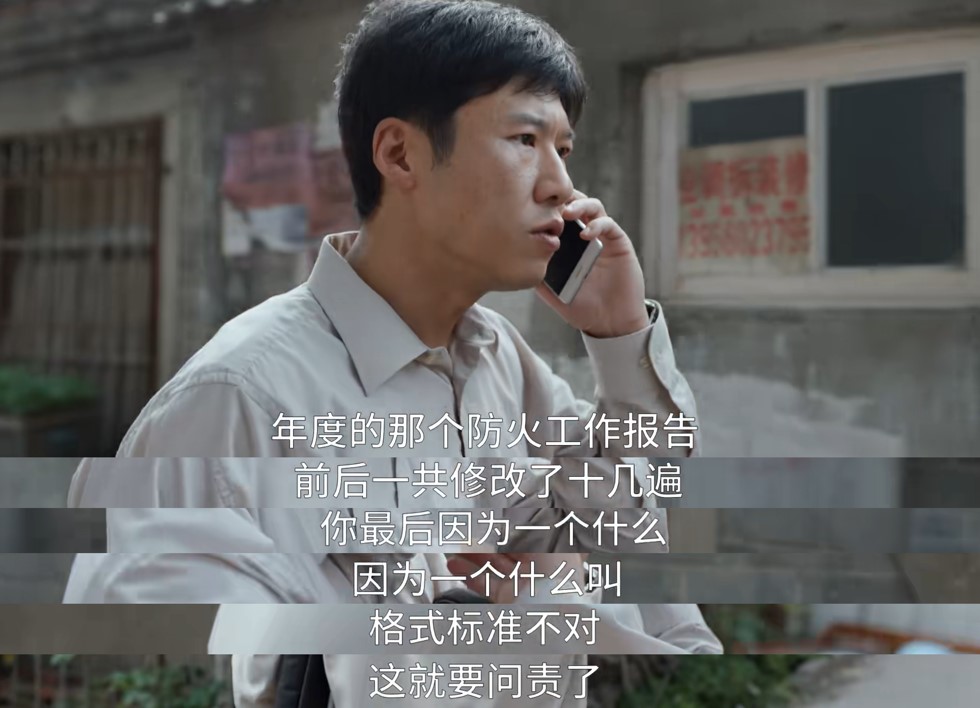
There are indeed many kinds of assessments at the grassroots level
Then Qiao Shengli said that in order to evaluate the provincial demonstration town, the cadres in the town did not sleep through the night except for a cold and fever; 99% of the work in the town was done well, but one key task was not done well. The ranking became the fourth from the bottom. As soon as he finished speaking, his wife came to bring him antihypertensive medicine with a face full of anger.
At the moment of key tasks, it is normal for grassroots cadres to have homes and have no time to return. There is no shortage of slightly funny lines in the play to laugh at this point. For example, the county held a scheduling meeting late at night, and a colleague asked Qiao Shengli to have dinner, and Qiao Shengli hurried home, "If I don't go home again, my wife will remarry overnight." This is what the director of the county government office laughed at himself when chatting with the director of the county finance bureau. The director said that since he became the director, "he rarely even saw my wife's face", and the office director said, "Don't tell me, I don't remember whether my wife has long hair or short hair now"...
These are very down-to-earth conversations, and it is indeed the working status of many grassroots cadres-due to busy work, they have no time to spend with their families.
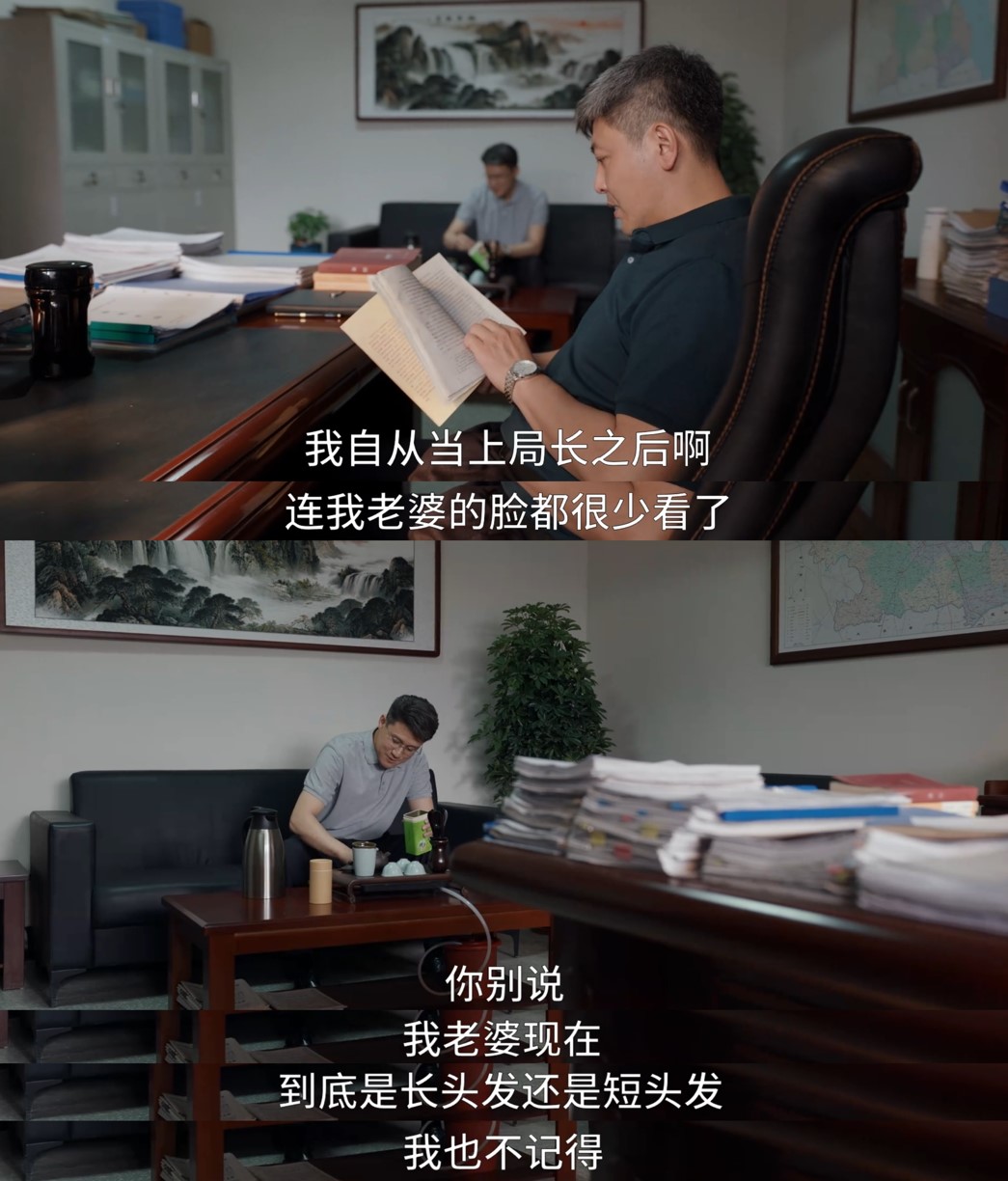
Small talk in private
In the play, the much-criticized "Wen Shan Hui Hai" in the grassroots work is also more implicit. The meeting scenes in the play have been restrained as much as possible, but there are still many. There are many various key tasks in the county, and most of them need to be checked by the leading group of the county party committee, so the leaders often have meetings all the time. After "Wen Shan Hui Hai", there will generally be various tasks falling on the heads of more grassroots staff.
For example, Mei Xiaoge wanted to see the economic data of the past ten years, and told the director of the office, and the director passed it on to the staff below. With the help of Zhiwei (played by Zhang Xincheng), Lin Zhiwei worked overtime to do things well and slept directly in the office.
This is a typical little detail. It cannot be said that it is wrong for Mei Xiaoge to look at economic data. This is his authority and a manifestation of his achievements. But the fact is this: as soon as the leader speaks and works hard, the subordinates often have to work overtime and stay up late, exhausting themselves.
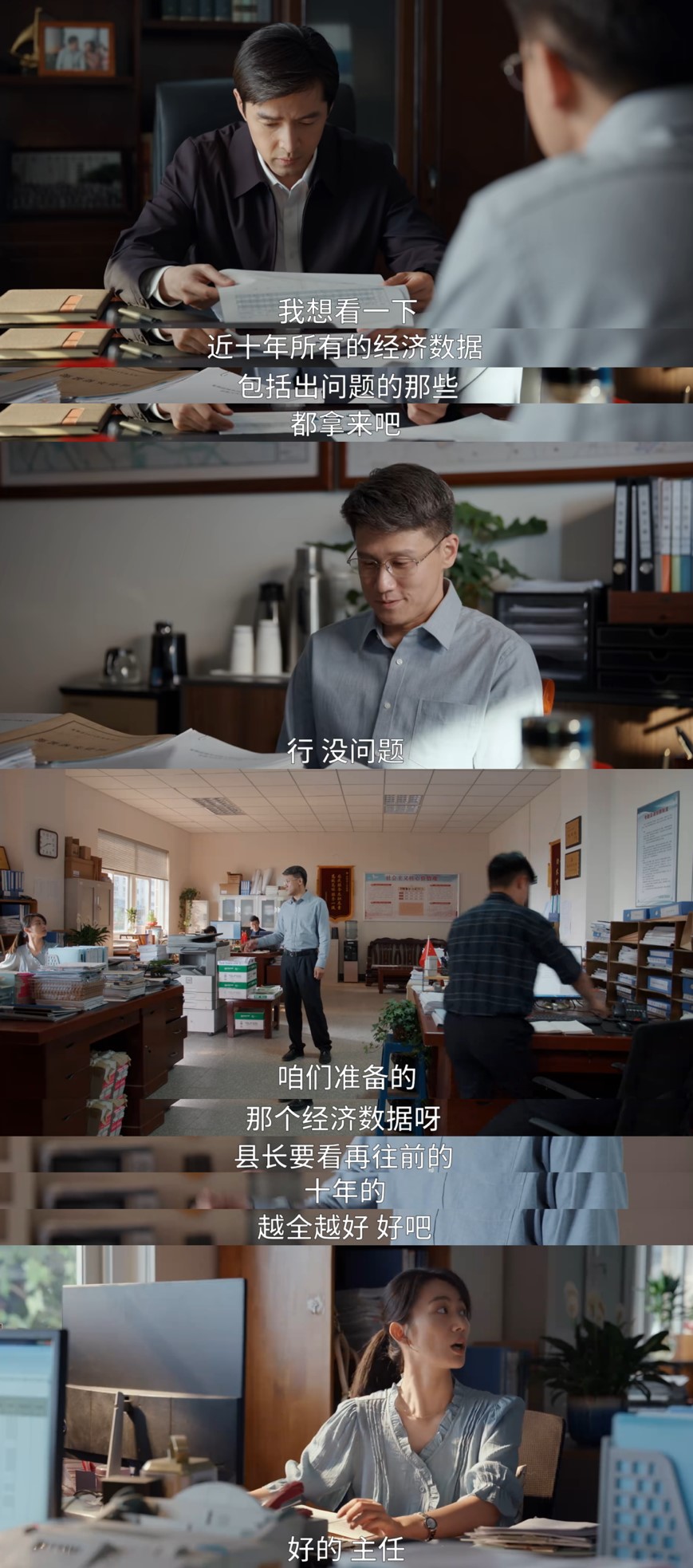
The task is passed down layer by layer.
Of course, although Mei Xiaoge and Ai Xianzhi are the first and second leaders of the county party committee, they also have "leaders" and they are also "responsible to their superiors". Indicators are waiting for them, and they have to "beg grandpa to sue grandma" to ask for money and projects and support from above.
The series does not shy away from this at all. Ai Xianzhi (at this time she has been promoted to the county magistrate and deputy secretary of the county party committee) said directly during the meeting, "The county just wants to see the money, and all units must go to the province more. , and pay attention to the way of communication, don’t be ashamed to ask for talent, and shameful if you can’t ask for talent.”
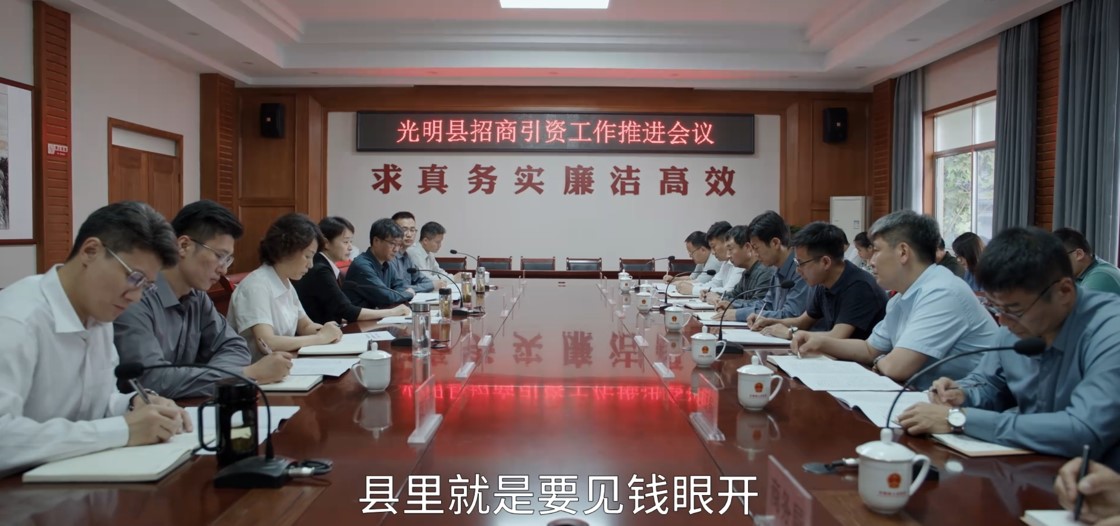
Leaders also have to ask for money from above
For example, in order to get an agricultural project for the county, Ai Xianzhi entrusted an old classmate from the Provincial Department of Agriculture to set up a bridge, and finally got the director of the Provincial Department of Agriculture to drop by (only by the way) to Guangming County when he was inspecting the neighboring county. have a look. The sky was not beautiful and it was raining heavily, and the director was muddy all the way during his inspection; his subordinates were unreliable, they wrote the name of the director wrongly, and even gave gifts blatantly, which made the director leave with an unhappy face. In the torrential rain, Mei Xiaoge (at this time he had been promoted to the secretary of the county party committee) rushed to the city and waited for the director at the gate, hoping to remedy it.
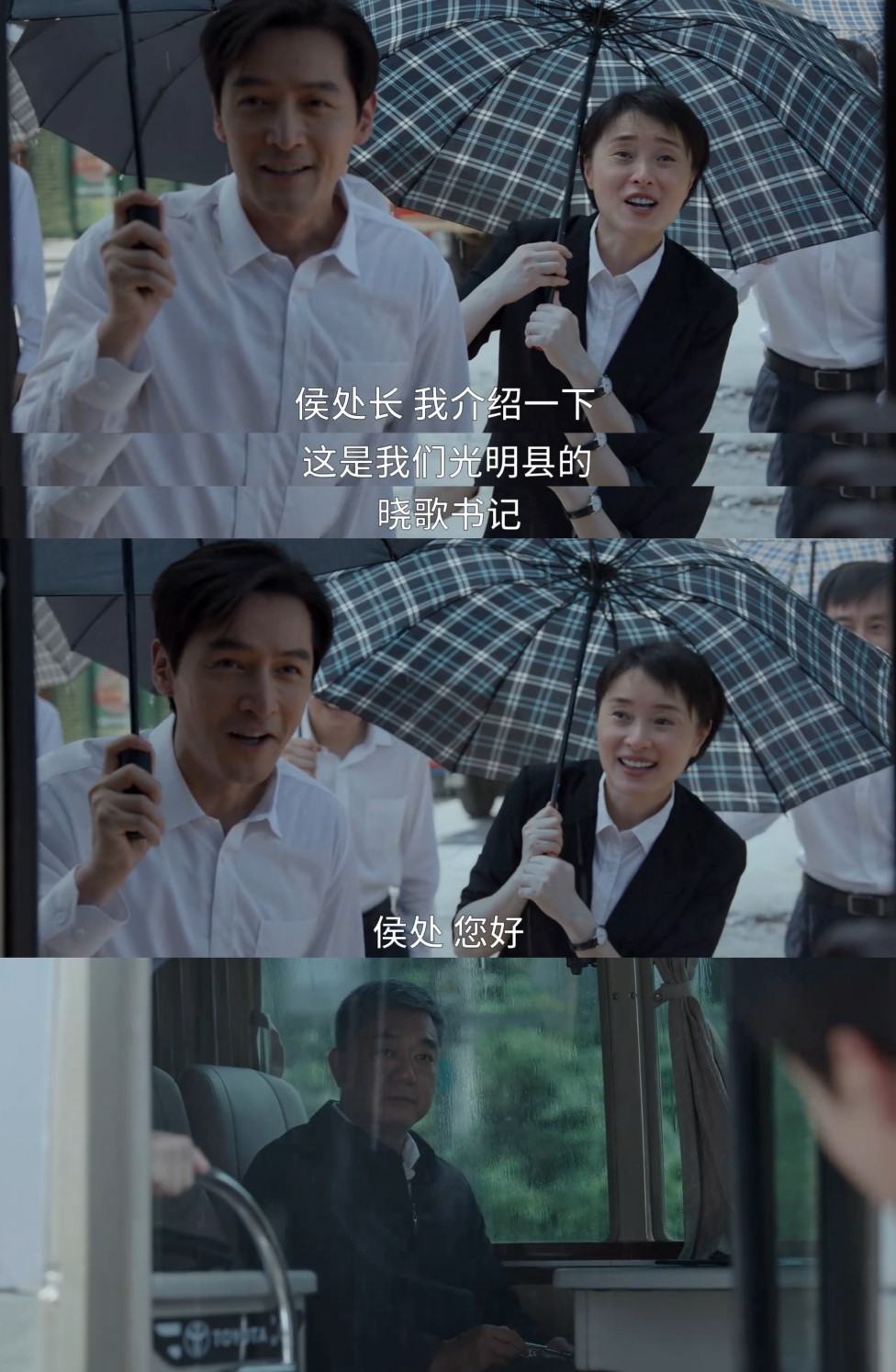
Leaders have to be cautious in the face of bigger leaders
In short, in the official system, although you may be someone else's superior, you are also someone else's subordinate, and if you are a subordinate, you have to work "to the superior".
It is not easy to do the work "to the top", but it is equally difficult to work "to the bottom".
To ensure the implementation and implementation of policies, it is inseparable from the support of ordinary people. But the more you go to the grassroots, the more difficult it is to do the front-line work. On the one hand, the lower the level of administration at the grassroots level—basically the lowest level, their manpower, material resources, financial resources, jurisdictional power, etc. do not have the ability to solve problems all at once. On the other hand, grassroots workers are not only faced with ordinary people, but also with a set of deeply rooted rural value systems that cannot be penetrated by needles or water. As Mei Xiaoge said, "the countryside has its own The rules of survival, laws and policies, the elderly don’t listen to them at all.”
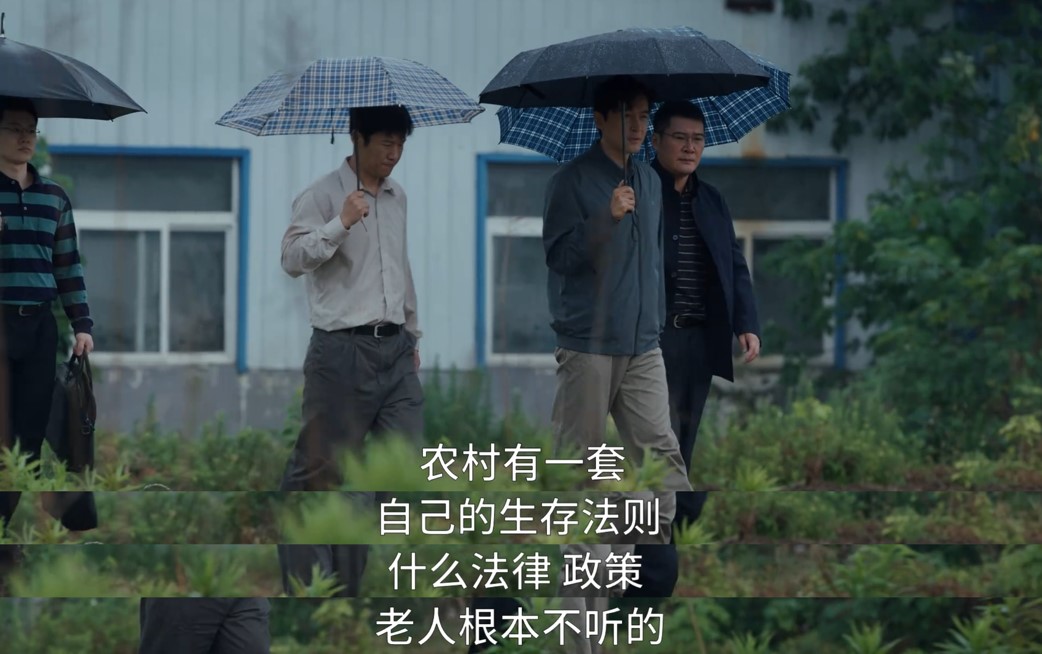
Grassroots work is not good
In the play, whether it is demolition, petitioning, the closure of township enterprises with pollution problems, or the flat graves that directly conflict with rural values, every task is a hard nut to crack, and grassroots cadres will encounter several "thorns". head", they have to do the ideological work of the masses over and over again.
Perhaps for the appropriate dramatic effect, many tasks in the play are directly dealt with by the leading groups of the county and town. For example, when demolition encountered "nail households", from Qiao Shengli, secretary of the township party committee, to Lu Qingshan, secretary of the county party committee, they worked hard over and over again. In real life, these tasks are almost all carried out by grassroots cadres. After all, the top leaders have so many things to do, how can it be possible to do everything by themselves.
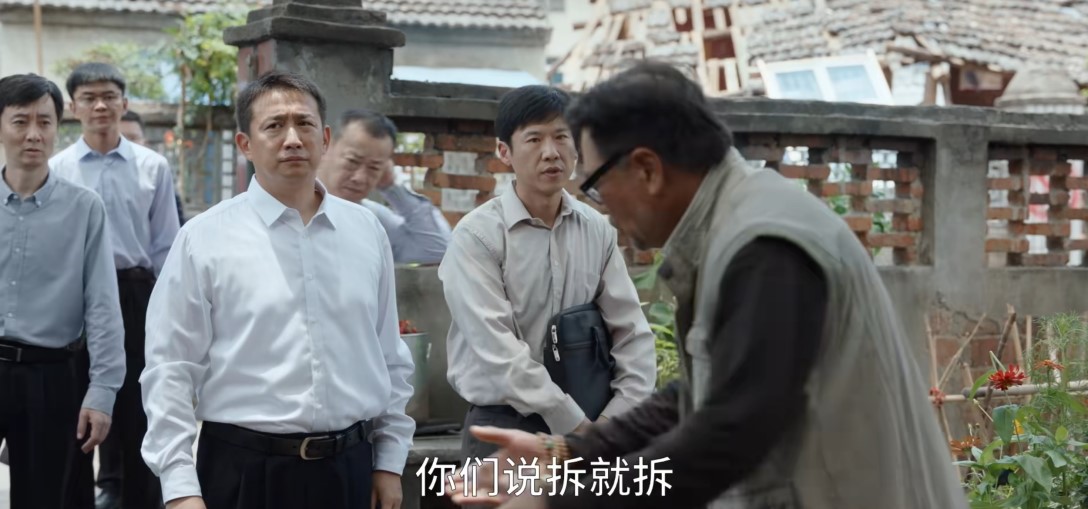
Generally speaking, the leader seldom handles these matters personally
Another example is that in order to intercept the nail households, Ai Xianzhi rushed to intercept them himself. In real life, it is basically the grassroots cadres who belong to the territory to stop, not to mention that petitioners only go to the county government or city government. This is still common in grassroots society. If the petitioner went to Beijing to appeal, Ai Xianzhi's reaction might be closer to reality.
In the handling of the "downstream" work, "County Party Committee Compound" certainly magnifies the "busyness" of leading cadres - it seems that they have to do everything in person; in fact, the drama has greatly simplified the difficulty of grassroots work , the handling of some grassroots problems in the play is still a little easier.
For example, when the demolition turmoil, the old comrades took the lead, and the "stab head" immediately agreed to relocate.
Then there is the turmoil of flat graves. Viewers who have experience in rural life will know how difficult this job is and how much resistance there is. Perhaps some viewers will still remember the Zhoukou burial incident that actually happened 10 years ago. At that time, it was a national sensation and extremely controversial. It finally came to an end after the State Council was alarmed. The "County Party Committee Compound" dealt with this issue more idealistically: Mei Xiaoge persuaded several leaders in the village with his speech; The analysis of the dilemma won the support of the family elders.
It is true that their speeches are very sincere and well-spoken, but it is difficult to change folk customs and sentiments all at once based on this alone.
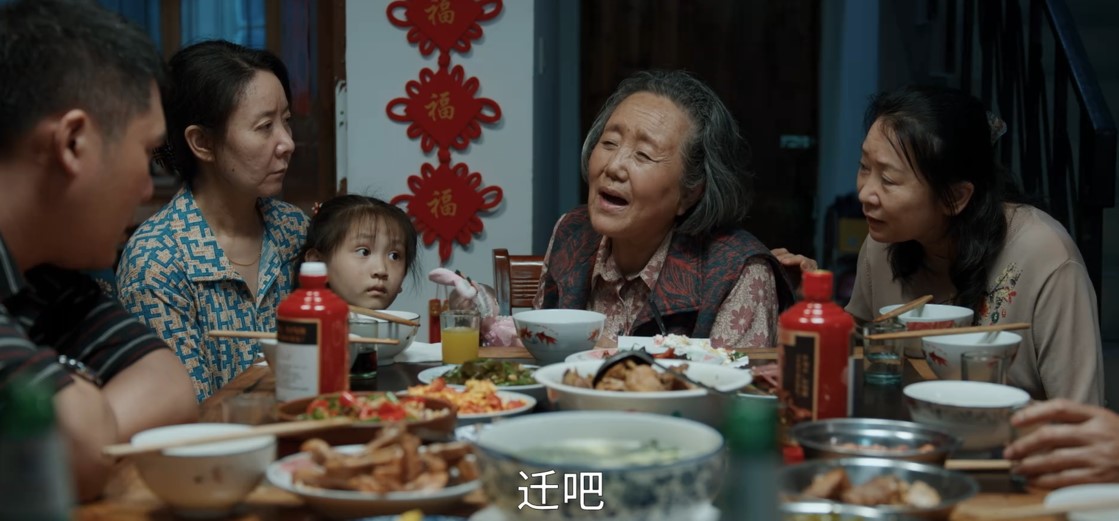
The turmoil of flat graves was easily subsided
In the handling of the relationship between cadres and the masses, "County Party Committee Compound" also has the characteristics of being too idealistic.
One is that as mentioned above, almost all major and minor matters (from persuading demolition households to stopping visits) are handled by the leadership of the county party committee and the top leaders of the township, which is very rare in practice. The other is that grassroots cadres almost always deal with those difficult "thorns"; in terms of the relationship between cadres and the masses, grassroots cadres are almost written as the completely weak side.
The intention of the screenwriter is of course well-meaning-to give grass-roots cadres a positive image through such a big drama, to cheer and encourage them; but it will more or less deviate from the "bottom perspective", forming cracks in the script.
For example, in the process of chasing dramas, many viewers will be fans of Qiao Shengli, played by Wang Xiao. As the leader of Chengguan Town, he devotes himself to work, running and working hard. But it is such a lovely grassroots cadre who is willing to do things, his electric car was punctured, and the glass in his house was smashed...
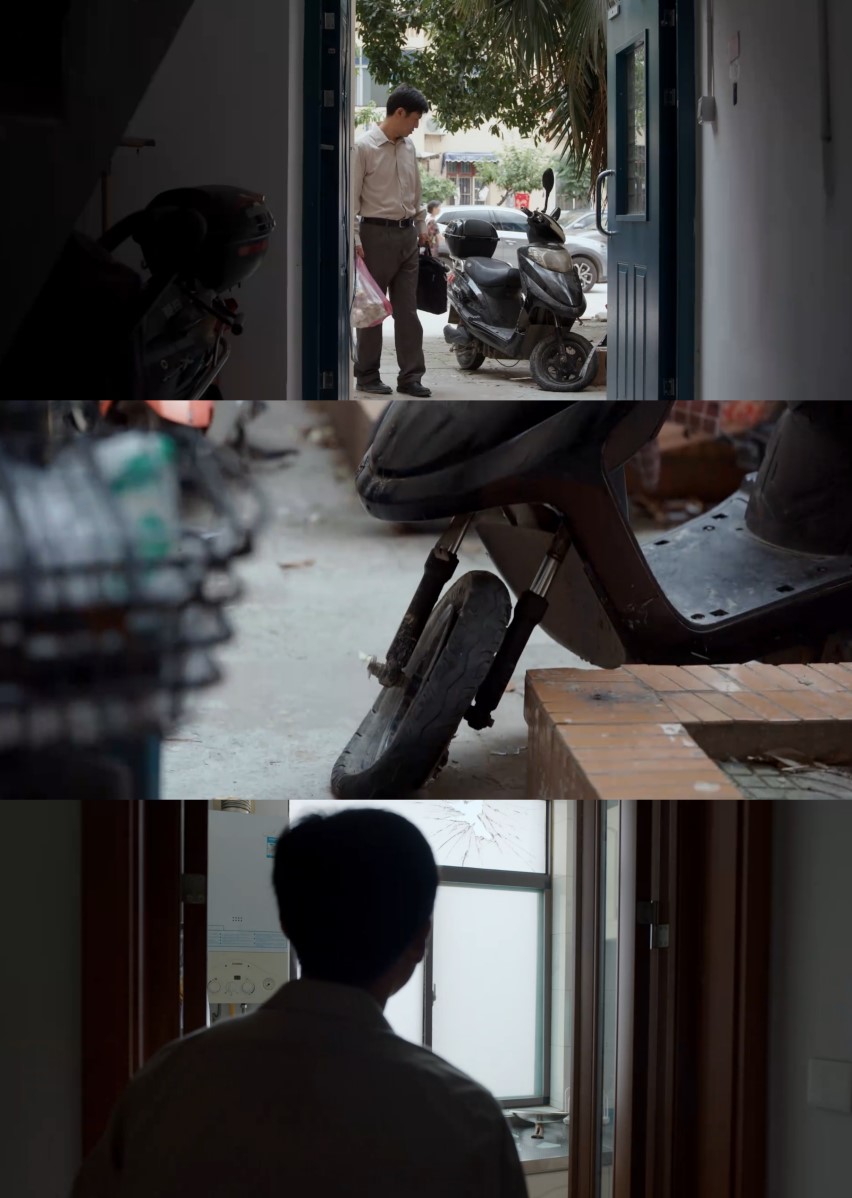
Why are such good grassroots cadres targeted by the masses?
Qiao Shengli's "uselessness" to the outside world and the inside, and to the top and the bottom is really distressing, but it also aggravates the audience's confusion: such a good cadre, why is his work not understood by the masses? Why is he so tired? Obviously he is so kind, why is he repeatedly in an embarrassing situation? Could it be that the people are "troublemakers", so they can't understand good cadres?
This should not be the direct intention of the screenwriter, but in terms of handling the relationship between cadres and the masses, the drama still gives people the impression that the cadres are good cadres, but the masses do not understand them well.
This also led to the "County Party Committee Compound"'s handling of the "downward" work, which is generally not as exciting as the "upper" work. In the "upper" part, the status of the grassroots cadres is undisguised; in the handling of the relationship between the cadres and the masses, it does not consider enough the weak status of the people at the bottom. It is undeniable that there are "thorns" among the masses, but most of the people have a weak mentality when facing officials. After all, no matter what you say, the common people are the ones who have no power or power. When dealing with the relationship between cadres and the masses in the drama series, the principle of balance should still be grasped.
But in any case, "County Party Committee Compound" is getting better and better, and its flaws are not concealed. It leads the audience into the grassroots political ecology, understands the operation status of grassroots work, deeply understands the connotation of "county governance, world peace", and also appreciates a group of people. The investment and dedication of grassroots cadres who are central and serve the people. Guangming County is also the epitome of thousands of grassroots administrative units. Through the gorgeous transformation of Guangming County, the audience will be able to glimpse the great process of modernization of the national governance system and governance capabilities.


